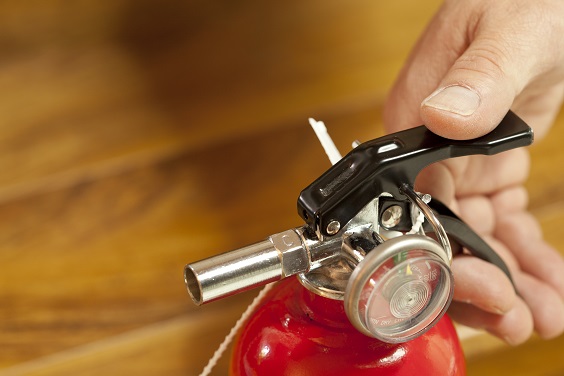Dangers of Using the Incorrect Fire Extinguisher
During a fire, panic may set in and all you might focus on is putting the blaze out as fast as possible, using whatever fire extinguisher you have to hand. However, there are different types of fire extinguishers for different types of fires (which you can read about in detail here) – each must be used exclusively for the type of fire they are designed for to avoid making things worse. In this month’s article, we’ll be explaining the dangers of using the incorrect fire extinguisher for a fire.
The Different Types of Fire Extinguishers
Briefly, we’ll first outline the different types of fire extinguishers, which are:
- Water
- AFFF Foam
- Carbon Dioxide
- Dry Powder
- Wet Chemical, or Dry Water Mist
Water fire extinguishers are to be used primarily for dealing with fires fuelled by wood, paper or fabrics, not liquids or electrical fires.
AFFF foam fire extinguishers smother the fire to starve it of oxygen. They work well with liquid-fuelled fires.
CO2 fire extinguishers, on the other hand, are used for electrical and gas fires, working by starving the fire of oxygen.
Dry powder fire extinguishers can be used in a variety of situations, for liquid, wood and electrical fires. The powder debilitates a fire by stopping the chemical reaction from occurring.
Wet chemical fire extinguishers are required in kitchens where oil is used to cook. They are designed to stop specialist Class F fires, which other types of fire extinguisher cannot handle.
Water Fire Extinguishers – The Dangers
The danger of using a water fire extinguisher on an electrical fire is that you put yourself at risk of receiving an electric shock. Water conducts electricity, and although the fire may be preoccupying your thoughts and appear to be the only danger, there is still an electrical current to deal with. Water fire extinguishers have a low fire fighting rating because they are cumbersome (to cope with more aggressive fires) and can only be used on certain types of fire. Environmentally friendly additives, however, can be found in some types of water extinguisher that reduce their conductivity, making them safe to accidentally use on an electrical fire.
AFFF Foam Fire Extinguishers – The Dangers
Foam extinguishers can work in the fight against all manner of fires, even electrical. Nevertheless, the strong chemical composition of the foam makes it dangerous for use in certain environments, especially if a child might accidentally discharge the extinguisher. A water extinguisher might be better if children are likely to be in the area.
CO2 Fire Extinguishers – The Dangers
The main danger with CO2 extinguishers is that they will cause upset in a confined space. They starve a fire of oxygen, but in a confined space they’ll also reduce the amount of oxygen available to breathe. Again, if children are going to be around the fire extinguisher, you have to be careful of accidental discharge. Also, if the source of the fire is not removed, once the CO2 has dispelled the fire could reignite. They must never be used for dealing with fat or cooking oil fires and must have a frost-free handles.
Dry Powder Fire Extinguishers – The Dangers
Here, you must be careful to ensure that the fire doesn’t reignite once it has been extinguished. Dry powder fire extinguishers can choke a fire out, but they do not have a very good cooling effect, so if the fire is not 100% extinguished it could return. You must also be careful not to inhale the powder, so do not use these extinguishers in a confined space. Cleanup can be arduous too – the powder can damage soft furnishings, like carpets and fabrics, and computer hard drives.
Wet Chemical Fire Extinguishers – The Dangers
Whereas these fire extinguishers are designed with fires fuelled by cooking oil in mind, they can be used for all other types of fires, too. However, their effectiveness is limited when fighting other types of fires. They should not be relied upon solely in the fight against wood fires, for instance. The chemicals are also dangerous, so keep them away from children.
Fire Extinguishers & Risk Assessments with Cheshire Fire
Bearing all of this information in mind, you need to think carefully about what kind of fire extinguisher is right for your premises. Cheshire Fire can provide a range of fire safety services including fire risk assessments and the provision and maintenance of fire extinguishers throughout the Cheshire area. For specialist fire extinguishers and expert fire safety services for your premises, contact our friendly team today.

